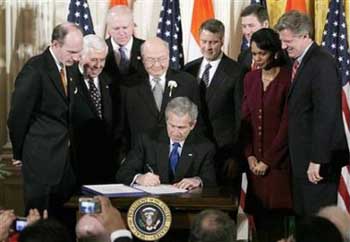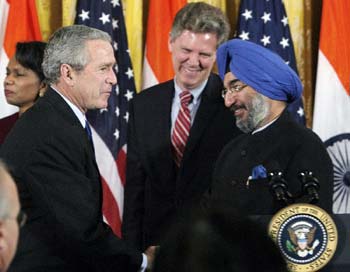| Tools: Save | Print | E-mail | Most Read |
| Bush Signs Nuclear Cooperation Deal with India into Law |
| Adjust font size: |
US President George W. Bush signed the nuclear cooperation deal with India into law on Monday to allow the United States to provide nuclear reactors and fuel to the ally for the first time in 30 years.
"The relationship between the United States and India has never been more vital and this bill will help us meet the energy and security challenges of the 21st century," Bush said at the bill-signing ceremony held in the White House. Bush made the move after the Congress approved the controversial nuclear cooperation deal between the United States and India on Dec. 9. The nuclear agreement, which was negotiated in March by President Bush and Prime Minister Manmohan Singh of India, would lift a decades-long ban on nuclear sales to India, in part, because of the country's refusal to sign the Nuclear Nonproliferation Treaty. The arrangement requires that the fuel shipments to be for civilian use only, yet opponents of the bill said that the deliveries of nuclear fuel would free up India's domestic stocks of nuclear materials for its weapons program. (Xinhua News Agency December 19, 2006) |
| Tools: Save | Print | E-mail | Most Read |
 |
| Related Stories |
|
Product Directory China Search |
Country Search Hot Buys |

